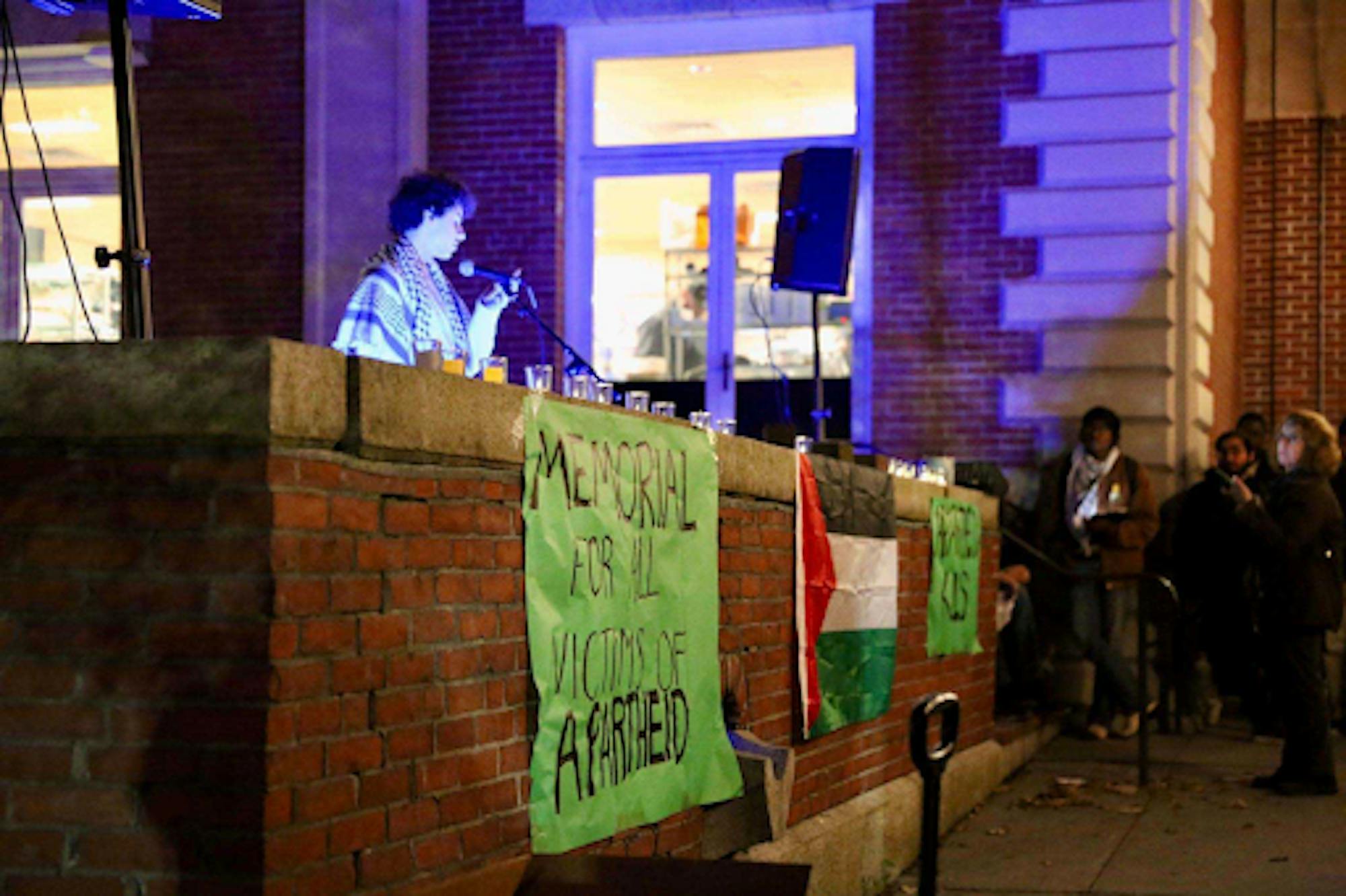On Oct. 19, members of the Dartmouth community attended a memorial service on the Collis Lawn co-hosted by the Palestine Solidarity Coalition and Al-Nur, the Muslim student association, in memory of Israeli and Palestinian lives lost in the ongoing Israel-Hamas war.
According to the PSC member Ramsey Alsheikh ’26, around 300 people attended the event, titled “Memorial for Victims of Apartheid.”
The event began with remarks from English and creative writing professor Jodi Kim, who quoted Palestinian poet Mahmoud Darwish and feminist intellectual Judith Butler. Her words were followed by a speech from University of California, Riverside Black studies Dylan Rodriguez, who noted the need to “be supportive” of Palestinian students.
“We need to recognize that you’re here and that to recognize your presence and your being is already a pushback against the unfolding genocide,” Rodriguez said.
While the United Nations has condemned “violence that indiscriminately targets innocent civilians,” it has refrained from calling Israeli actions a “genocide.” A genocide is defined by the UN as an act “committed with intent to destroy, in whole or in part, a national, ethnical, racial or religious group.”
Rodriguez emphasized the importance of “statements issued by institutions of higher education,” noting that they “carry a heavy burden as they're understood as bearing moral authority and academic expertise.” He said that it was “deeply distressing” that previous statements “irresponsibly wield[ed] charges of terrorism.”
College President Sian Leah Beilock characterized Hamas’s actions as “horrific terrorist attacks,” and the United States Department of State designated Hamas as a terrorist organization.
Following Rodriguez’s comments, history professor Golnar Nikpour noted that she teaches about the Israel-Palestine conflict in all of her classes. Nikpour said that the losses of loved ones during wars are communal tragedies, and added that “it’s good in those moments to be together.”
“There are these links that go through from each of us that we sometimes like to ignore, but in moments of grief and in tragedy, we come to remember again,” Nikpour said.
Two Palestinian undergraduate students, Yasmine Abouali ’26 and Ahmad Herzallah ’27, spoke about their experiences in the region. Herzallah said “living in Gaza [had] never been easy” and explained that he had “friends who had been killed by Israeli attacks.”
“I got used to the fact that people around me may die at any moment,” Herzallah said. “I got used to being anxious. I didn't know that you should not be feeling fear of losing a member of your family at any time.”
Ben Stevenson ’27, a member of the climate activist Sunrise Movement, spoke about the relationship between the Israel-Palestine conflict and climate justice. Stevenson, who is Jewish and supportive of Palestinian liberation, explained his perspective on the war.
“The United States funding and backing of the Israeli state is in part based on desire to control Middle Eastern oil,” Stevenson said.
“Our tradition commands us to speak truth to power by speaking out against apartheid,” Stevenson said. “As Jews, we can dispel the problematic narrative that anti-Zionism is the same as antisemitism.”
Student Worker Collective at Dartmouth organizer Ian Scott ’24 said that the SWCD stands with the PSC, and described his “horror” at the situation in the Middle East..
“We were shocked and we anxiously waited for details as the initial attack escalated into one of the worst chapters in the ethnic cleansing of Palestine that we have seen in our lives.”
Scott’s comments were followed by remarks from Samy Amkieh DM, a student at the Geisel School of Medicine, who read several verses from the Quran and argued there was a need for “healthcare workers to really wake up.”Amkieh then led chants of “Free free Palestine,” “End the siege of Palestine now,” and “Palestine will never die.”
The memorial service ended with Christian and Islamic prayers from Anthony Fosu ’24 and College Muslim chaplain Abdul Rahman Latif. Following the service, Palestine Solidarity Coalition leaders organized a procession to Parkhurst Hall in which community members planted 100 black flags in front of the administrative building. According to Alsheikh, each flag represented 300 lives, equal to the more than 3,000 lives that had been lost in the conflict so far.
In an interview after the event, Stevenson said he felt a “great sadness” following the Oct. 7 Hamas attack.
“When we hear about human lives being taken and people being murdered, we know that that's fundamentally wrong,” he said.
Stevenson added that while a diversity of perspectives exists, he believes that discussing and disagreeing about the conflict is important.
“I do my best to talk with people, engage in dialogue and try to see where they're coming from,” Stevenson said.
Attendee Mateo Perez ’24 said the event “was a good time for the Palestinian students and faculty who are in support of Palestine to voice their opinions.
“I don’t think that space was given at other events, so having that event for them just felt really powerful,” he said.
Ramsey Alsheikh ’26 is a staff Opinion columnist for The Dartmouth.




